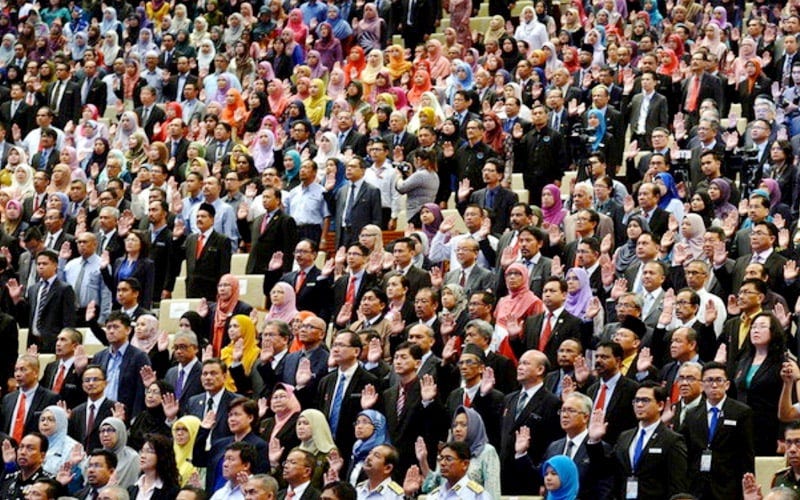Is the 13% pay increase for civil servants a political ploy?
Or is it a serious attempt to raise aggregate national wages?
Prime Minister and Finance Minister Anwar Ibrahim made a dramatic announcement to a crowd of civil servants in Putrajaya on May 1.
Civil servants will receive an unprecedented 13% pay rise beginning December.
This led to a range of criticisms that such a salary rise would lead to inflation, blow up the budget deficit and encourage inefficiency.
With Pakatan Harapan convincingly winning the civil service and police vote at the recent Kuala Kubu Baharu by-election, the pay hike led to criticisms that the move was just a cheap political ploy to win votes.
No doubt Anwar’s pay hike announcement was the biggest in the recent history of the civil service.
About 31% of government operational spending is for civil servants’ salaries.
This will increase public debt, now standing at RM1.19 trillion, depending upon which set of figures you look at.
However, this pay increase for the civil service will put money directly into the hands of consumers at the end of the year, which would keep the economy resilient through strong domestic demand.
This is the most effective and efficient way for the government to prevent private consumption from stalling in the near future. Private consumption was 59.1% of GDP back in December 2023.
The level of private consumption will be crucial for Malaysia’s GDP growth in the future. From this point of view, a RM10 billion increase in public debt may lead to a greater increase in private consumption through the multiplier effect.
Pay increase an effective driver for wage growth
For years now, economists have been arguing that wages across the economy have not kept up with GDP growth.
Thus, wages have effectively decreased over time. This means that wage earners have been missing out on their share of increasing economic prosperity.
This pay rise doesn’t just affect government officers in ministries. Also included are healthcare workers in government hospitals, teachers, public university staff and military personnel, some 1.7 million workers.
This is just over 10% of Malaysia’s total workforce of 16 million people.
Constitutionally, the government doesn’t have control over wages, except in the public sector.
Any decree by the government to raise wages for private sector workers cannot be enforced. Thus Anwar, by raising public sector wages, has sent a signal to the private sector to increase wages to maintain parity with salaries within the public sector.
There have already been positive signs this strategy is influencing other wage payers. For instance, the Sarawak government has announced it will consider following suit.
The government would hope that corporate Malaysia would follow suit. If the blue chip GLCs follow the government lead, the rest of the private sector would be under pressure to raise salaries as well.
Then, these wage rises should trickle down to other workers in the economy.
Any increase in the national wage would be a great reform.
What could go wrong?
Forcing higher national wages through the public service is not new. It’s a well-known fiscal tool used by governments for more than 70 years. Experience has shown that directing wage rises without increases in productivity can be dangerously inflationary.
Given that productivity is simply a calculation of outputs, measured in ringgit, over inputs also measured in ringgit, there are many ways to achieve rises in productivity.
The first is achieving efficiency internally. This involves organisational reform. This can be achieved through utilising zero-based and programme-based budgeting to contain operational costs.
Another method could be maintaining an employment cap to stop any swell of the bureaucracy. Yet another way to increase productivity is to increase the cost of government services to households. Some blend of the above would work best.
It’s going to be more critical in the private sector. Many are talking about the use of AI in business and this is being quickly seen within the banking system, where it is going digital.
AI can also be applied in education and the service sector. However, the collateral effect of AI will be job redundancy, which will lead to greater unemployment, unless new types of work can be found for those affected.
It is the trickle-down effect of any public sector pay rise that may affect other parts of the economy.
If there is any upward pressure on wages in the labour-intensive industries, then firms will have to make choices. Some of these choices may include employing cheaper foreign labour, or automating operations.
In both cases this will displace local employees and contribute to the ranks of the unemployed. Wage rises will also burden SMEs that are living “hand to mouth” with very tight liquidity and/or lines of available credit.
Thus, salary rises could potentially stifle any growth in private sector employment.
Salary rises must be part of a wider strategy, utilising both macro and micro economic initiatives.
The key to any pay rise is achieving a corresponding increase in productivity to offset the extra costs in the private sector. This is not easy to achieve.
Politically, the wage rise announcement appears to have paid off electorally with public service voters, if the results of the Kuala Kubu Baharu by-election are replicated in future elections.
Any costs won’t be seen until well into 2025 or even 2026. In the short term the pay rises may contribute to increased demand for consumer items.
However, in the longer term, the pay rises could trigger an increase in private sector unemployment, unless they are accompanied by corresponding increases in productivity.
Originally published in FMT 13rd May 2024
Subscribe Below:





13% bribe may cause a stir.
But 30% will get the civil servants to rise from the dead.
Almost...
PMX will do anything for political survival. This is politics. The rakyat decides the government through parliamentary democracy. Readers can write whatever they think right, sometimes. !! God bless Malaysia.